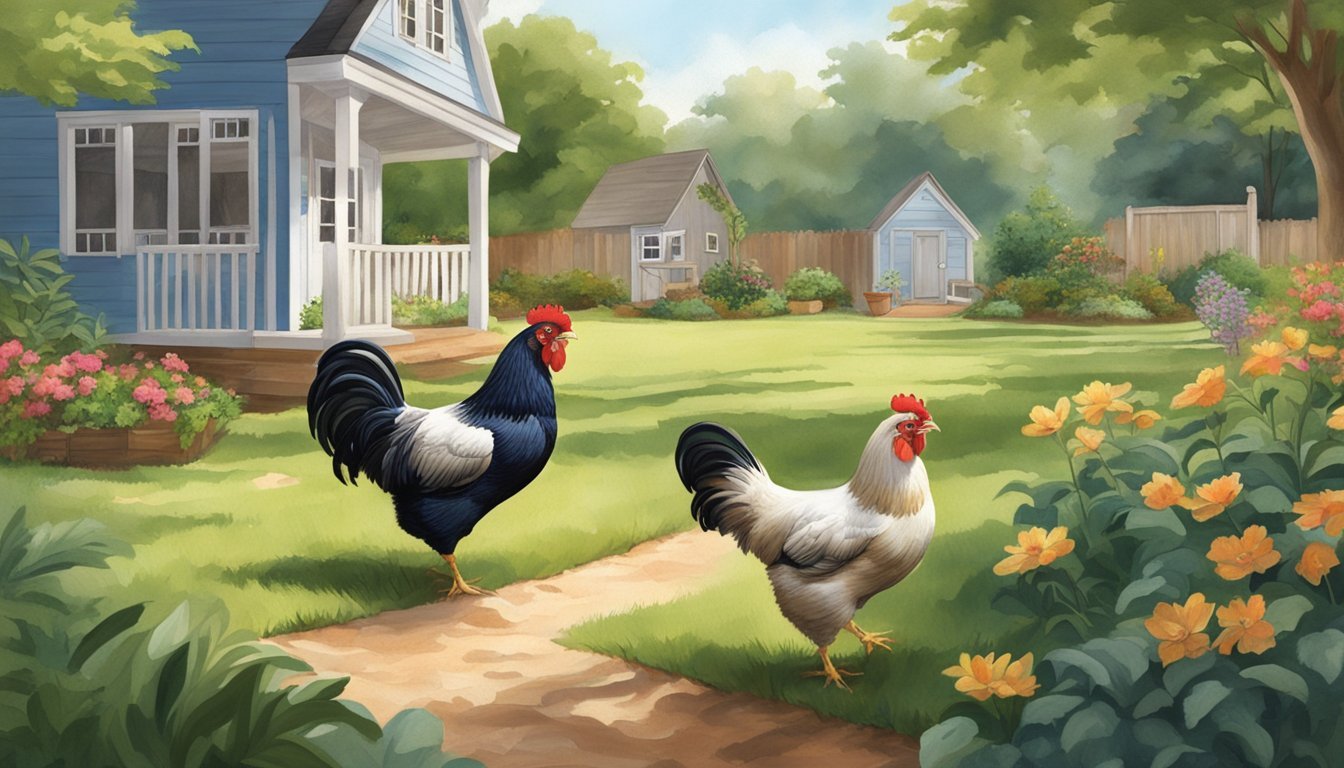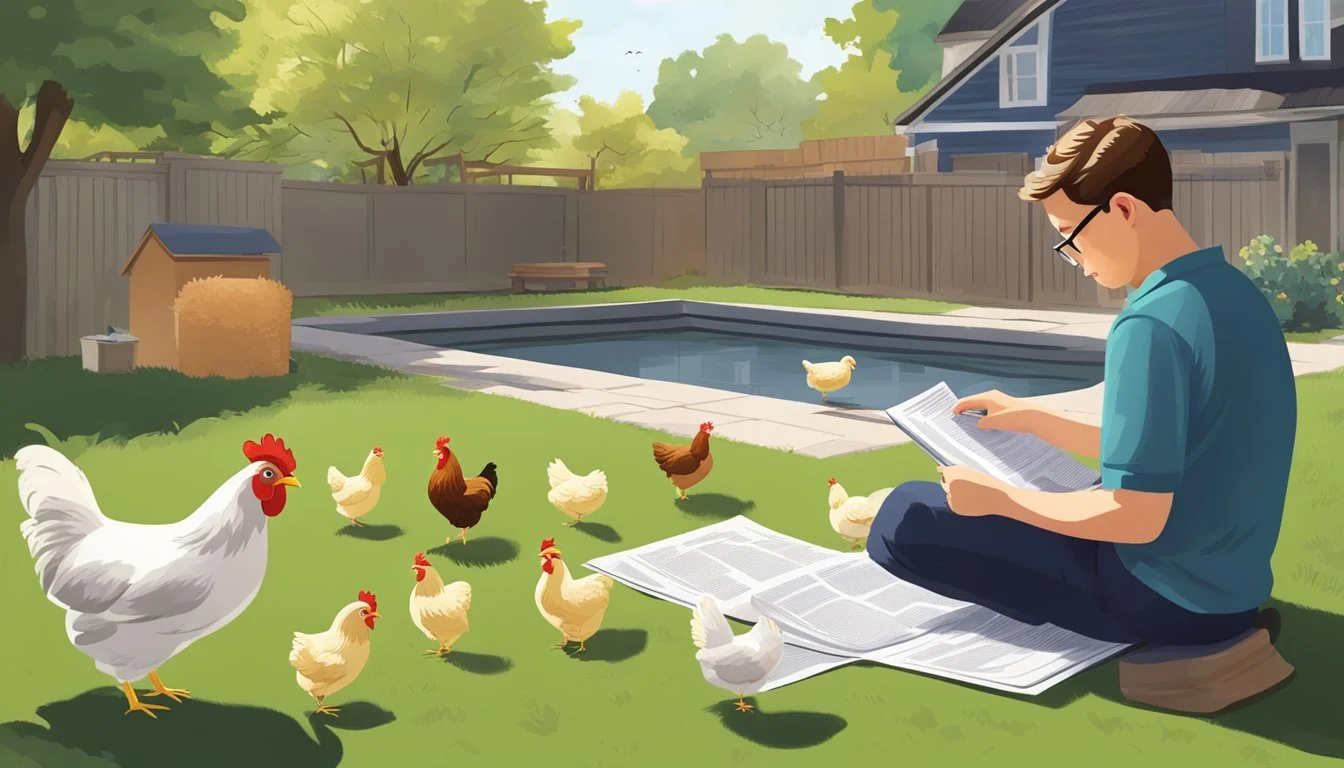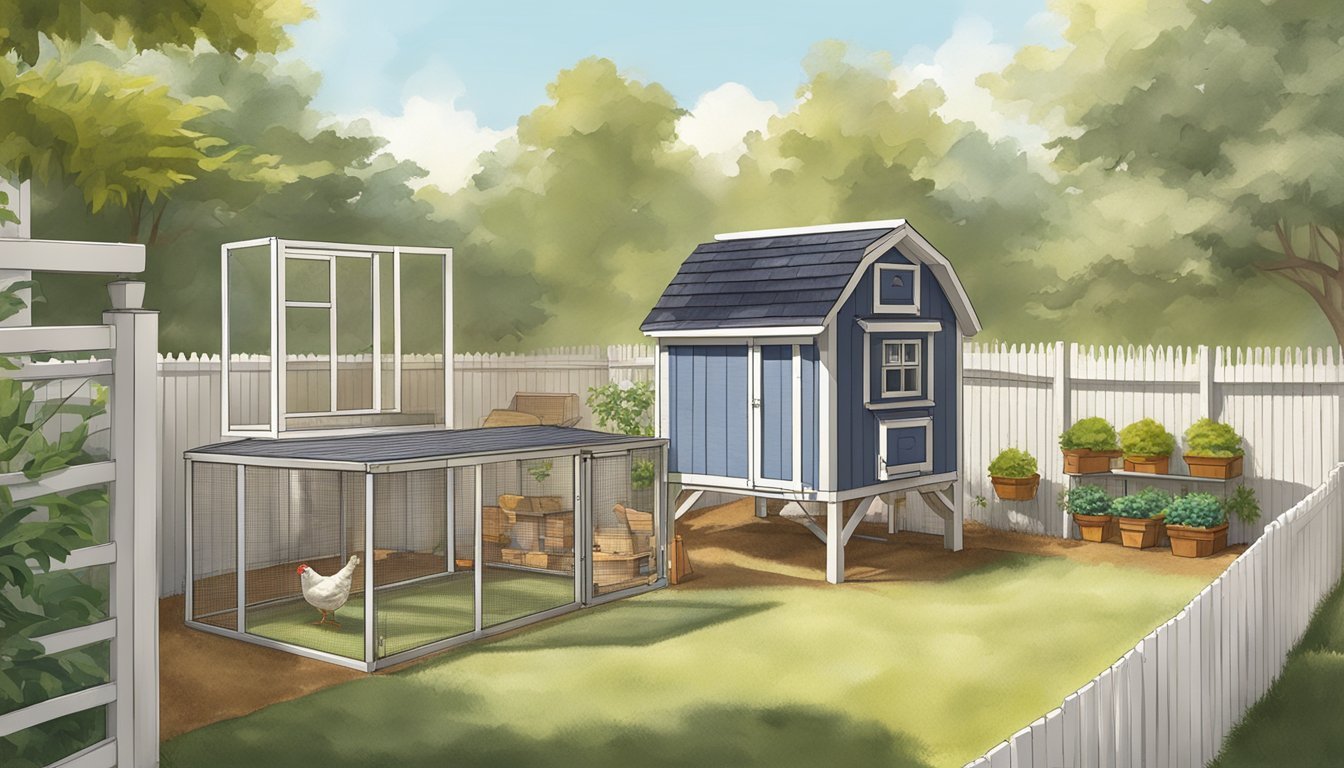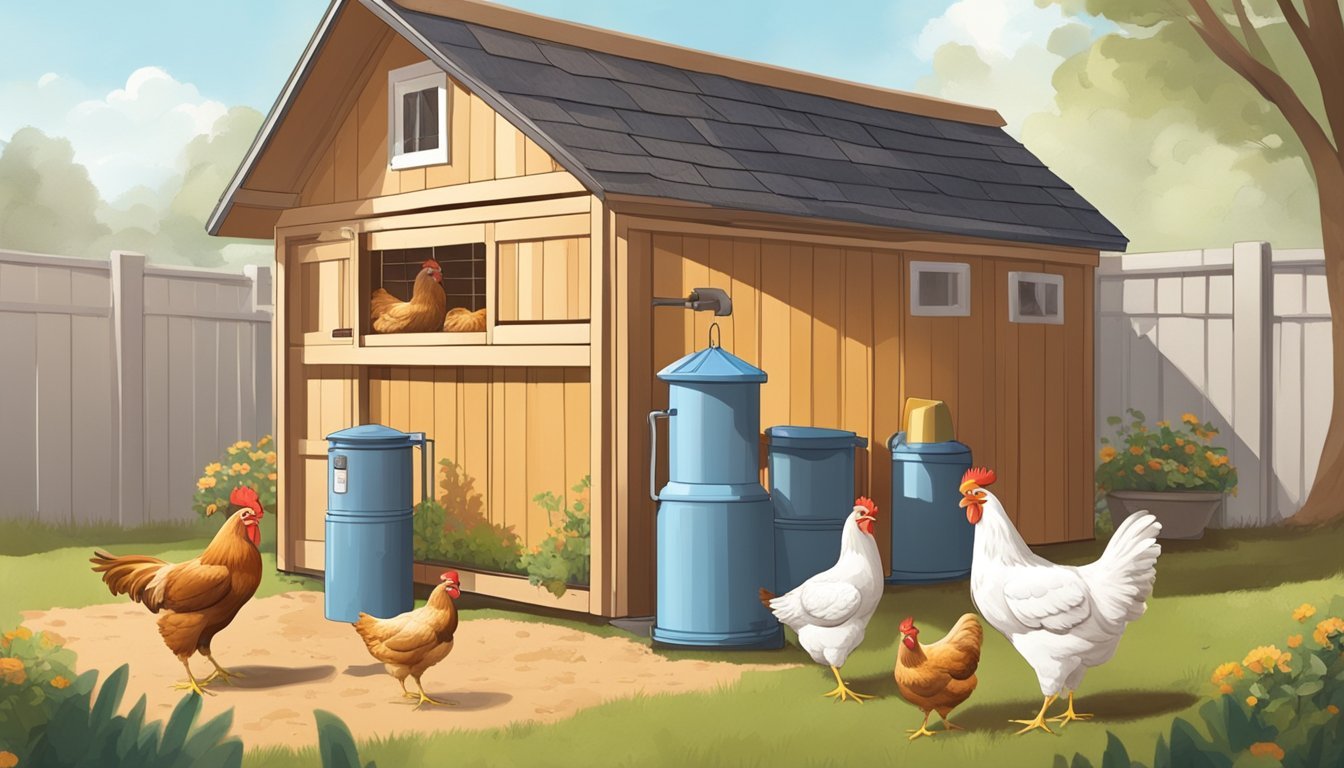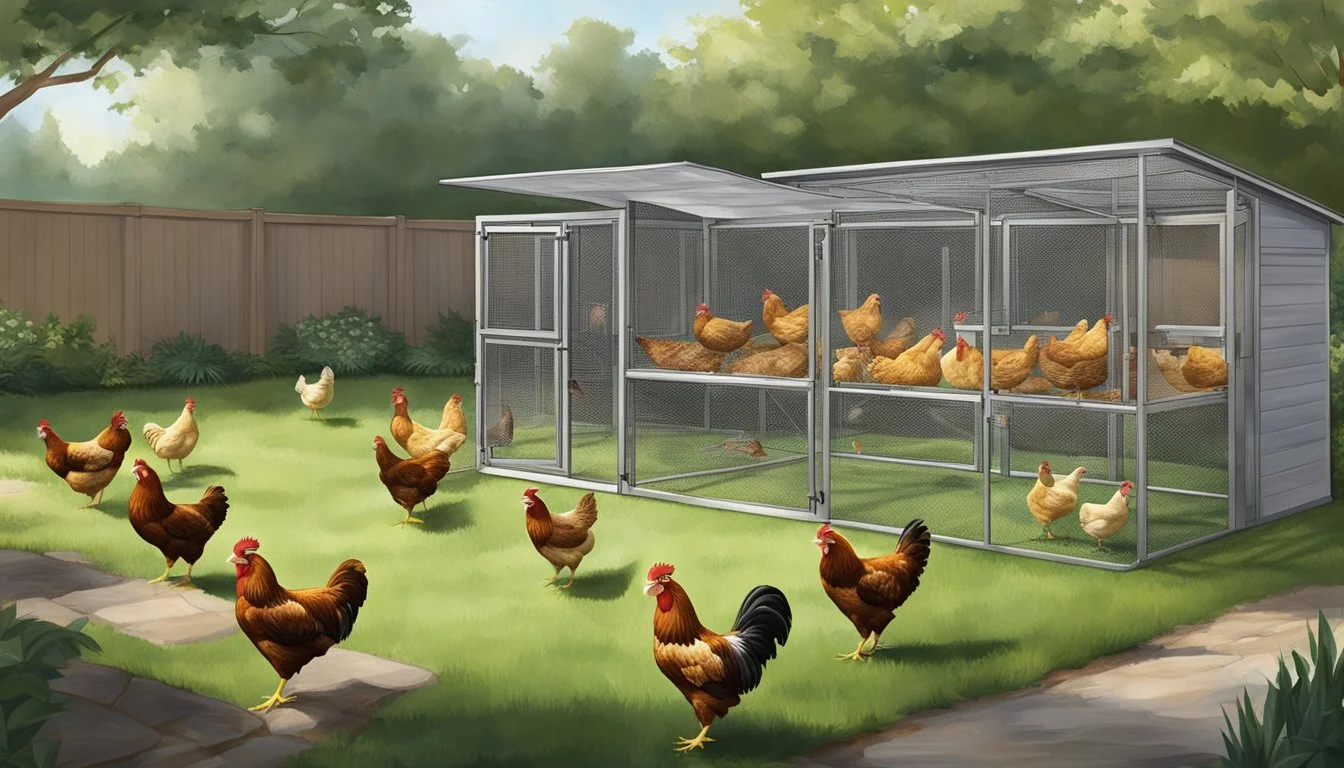Keeping Backyard Chickens in Wilmington, NC
Essential Tips for Urban Poultry Farming
With an increasing interest in sustainable living and local food sourcing, backyard chicken-keeping has become a popular practice among residents in Wilmington, North Carolina. This coastal city has specific ordinances catering to those inclined towards raising their own flocks. According to local laws, Wilmington residents are allowed to keep up to five female chickens per property, ensuring a steady supply of fresh eggs for their household while adhering to the urban livestock regulations.
Raising backyard chickens involves a set of responsibilities, such as providing a secure, fenced enclosure, to ensure the chickens' well-being and to adhere to local animal welfare guidelines. The city's ordinances emphasize that chickens must not be kept in front yards and roosters are prohibited to avoid noise disturbances. These rules reflect the city’s balance between urban living and the benefits of garden chickens as part of a suburban homestead.
In the wider scope of North Carolina, garden chickens are a recognized facet of both rural and suburban landscapes. However, regulations can vary significantly from one municipality to another. It is essential to consult with local government offices to understand the specific zoning laws that apply. This ensures backyard chicken enthusiasts in Wilmington and beyond can confidently and legally raise their flocks, contributing positively to the community while engaging in a rewarding agricultural pursuit.
Legal Considerations Before Starting
Prior to establishing a backyard chicken coop in Wilmington, NC, prospective owners must be diligent in understanding local regulations. This section breaks down the critical legalities one should address to ensure a smooth and compliant start.
Understanding Wilmington's Zoning Laws
In Wilmington, zoning laws dictate where and how poultry can be kept. City ordinances specify that chickens may only be kept on a tract of land that allows for such use, ensuring they do not become a public nuisance or threaten public health. It's imperative for residents to verify their property's zoning classification with the zoning office before starting their chicken keeping.
Navigating Regulations and Permits
The city of Wilmington requires adherence to Article II, which covers the domestic fowl regulations. Any owner or keeper must not permit chickens to run at large, and a specific number may be allowed depending on the size of the property. Permit requirements, if any, should be confirmed with Wilmington's animal control unit or through other relevant city resources.
Dealing with Neighbors and Community
One must consider the proximity of the chicken coop to the property line and the potential impact on neighbors. To prevent disputes, one should inform and discuss plans with neighboring properties to maintain good community relations and ensure that the coop does not classify as a public nuisance.
Finding Reliable Legal Resources
For accurate and up-to-date information, individuals should consult the NC State Extension and utilize resources provided by the city or state for specifics on maintaining backyard chickens. This can include online databases, local ordinance codes, or direct consultation with the zoning office or other regulatory bodies.
Choosing the Right Chicken Breed
When selecting breeds for keeping backyard chickens in Wilmington, NC, one should consider each breed's distinct characteristics and their adaptability to the local climate. These considerations are important to ensure a healthy and productive flock.
Characteristics of Popular Breeds
Barred Rock (Plymouth Rock): Renowned for their hardiness and friendly nature, Barred Rocks adapt well to confinement and are known for being excellent layers of large brown eggs.
Rhode Island Reds: These birds are one of the most popular chicken breeds due to their adaptability and are exceptional layers of brown eggs. They're also quite resilient and can be perfect for first-time chicken owners.
Leghorn: Leghorns are prolific white egg layers with a preference for warmer climates. They are recognized for their ability to forage and have an independent temperament.
New Hampshires: A heritage breed known for its rapid growth and early feathering. They are friendly, good layers of brown eggs, and are well-suited for meat production.
Sussex: This breed offers a calm disposition and is a reliable layer of light brown or tinted eggs. Sussex chickens have a good feed-to-egg conversion ratio, making them economical for backyard flocks.
Wyandottes: They are a heritage breed with a calm and docile personality, and they are good producers of brown eggs. Their laced feather pattern makes them particularly attractive.
Adaptability to Wilmington's Climate
The climate in Wilmington, NC, is moderately warm and humid, with mild winters. It is ideal for chicken breeds that can handle these conditions without significant stress.
Plymouth Rocks and Rhode Island Reds are hardy breeds that tolerate both heat and cold well, making them suitable choices for Wilmington's varied climate.
Leghorns thrive in warmer weather, which aligns well with the area's summer temperatures, but they might require additional shelter during the cooler months.
Wyandottes and Sussex are also well-suited for Wilmington as they are robust breeds that can manage the temperature fluctuations common in the region.
Selecting the right chicken breed requires a balance between the bird's needs and what a keeper can provide. Thus, choosing breeds like the Plymouth Rocks, Rhode Island Reds, and Sussex may prove advantageous for Wilmington residents interested in backyard chicken-keeping.
Setting Up Your Chicken Coop
When establishing a backyard chicken coop in Wilmington, NC, it's essential to focus on the construction of a safe and comfortable habitat. A well-designed coop and run, effective protection, and a robust hygiene regimen are paramount for the well-being of your flock.
Designing a Suitable Coop and Run
A backyard chicken coop must provide at least 10 square feet of space per chicken, ensuring enough room for the birds to live and move comfortably. The run – a fenced enclosure attached to the coop – should be spacious, allowing the chickens to roam and exhibit natural behaviors. The coop should have:
Ventilation: Proper air circulation without causing drafts.
Insulation: Protection against heat in summer and cold in winter.
Nesting boxes: One box for every three to four hens.
Perches: A place for birds to roost, spaced to prevent over-crowding.
Ensuring Adequate Protection and Shelter
Chickens require protection from predators and extreme weather conditions. The coop must be secured with sturdy materials that can't be easily compromised by predators. Tips for protection include:
Fencing: Use hardware cloth instead of chicken wire for stronger defense.
Locks: Install raccoon-proof latches on doors and windows.
Roofing: Ensure the coop has a solid roof to shelter from rain and sun.
Maintaining Hygiene and Managing Waste
To keep the chicken coop clean and sanitary, a regular cleaning schedule is crucial. Waste management is important as chicken manure can accumulate quickly, posing health risks. Implementing the following practices will help:
Litter: Use absorbent materials like straw or pine shavings and change them regularly.
Manure Removal: Frequently remove excrement to prevent the buildup of ammonia.
Sanitation: Periodically disinfect the coop to eliminate pathogens and pests.
Proper coop maintenance and sanitation are integral to a healthy chicken environment and will contribute to a happy and productive flock.
Daily Care and Management
The daily care and management of backyard chickens in Wilmington, NC, require a consistent routine that ensures the birds’ nutritional needs are met, they have access to clean water, their health is regularly monitored, and eggs are safely collected.
Feeding and Nutrition
Chickens require a balanced diet to maintain their health and optimize egg production. A typical feeding regimen includes:
Layer pellets: a primary source of nutrition for laying hens.
Grit: aids in digestion, necessary for chickens as they do not have teeth.
Calcium supplements: such as oyster shell, essential for strong eggshells.
Kitchen scraps: can be given in moderation; avoid anything salty, greasy, or spoiled.
Proper nutrition is critical for hens to produce high-quality eggs. Avoid sudden changes in their diet which can disrupt laying patterns.
Water Supply and Regulation
Water is vital for the chickens':
Health: Clean, fresh water must be available at all times.
Temperature: Water should not be too cold or freeze in the winter.
Owners should regularly check and clean water containers to prevent algae growth and contamination.
Health Monitoring and Veterinary Care
To ensure the wellbeing of backyard chickens:
Daily observation is key to spotting signs of disease or illness.
Veterinary care: Establish a relationship with a vet familiar with poultry.
Owners should look for changes in behavior, appearance, and egg production that can indicate health issues. Preventative measures such as vaccinations should be discussed with a veterinarian.
Egg Collection and Management
Efficient egg collection involves:
Regular collection: At least once a day to avoid egg spoilage or hen brooding.
Clean nesting boxes: Minimizes the need for cleaning eggs and deters pests.
Keeping the nesting area clean helps in producing clean, safe-to-consume eggs and reduces the chance of eggs being cracked or damaged.
Flock Dynamics and Behavior
Keeping backyard chickens involves understanding their social structures and behaviors to maintain a healthy and productive flock. High-quality egg production and peaceful coexistence rely on this knowledge.
Understanding Social Behaviors
Chickens establish a pecking order that determines their access to food, mates, and nesting sites. It is vital to observe their interactions, as disruptions in the hierarchy can cause stress and aggression within the flock. Introducing new chickens should be done with care to minimize conflict and allow for a smooth integration into the existing social structure.
Managing Roosters Among Hens
If roosters are present, they typically assume a protective role and can contribute to the flock's social stability. However, too many roosters can lead to excessive breeding behavior and stress among the hens. It is recommended to maintain a balanced ratio of one rooster to every ten hens to ensure harmony and prevent the need for rehoming unwanted roosters.
Caring for Chicks and Pullets
Day-old chicks require a safe, warm, and monitored environment to thrive. As they grow into pullets, it’s important to gradually introduce them to the adult flock. Pullets typically reach laying age at about 18 to 20 weeks old, at which point they can be fully integrated into the flock following the established pecking order. Proper care during these early stages leads to a cohesive and productive flock dynamic.
Advanced Topics in Poultry Care
Exploring advanced topics in poultry care is essential for poultry enthusiasts who wish to optimize the health and productivity of their flocks. Whether interested in the genetic intricacies of breeding, the challenges of health management, or the benefits of by-product utilization, a well-informed approach can significantly enhance the chicken-keeping experience.
Breeding and Developing Your Flock
Selective breeding allows for the development of desired traits within a flock. Poultry keepers in Wilmington may choose to focus on:
Egg production: Breeds like the Rhode Island Red or Plymouth Rock are popular for their higher egg yield.
Temperament: Docile breeds are preferred for urban settings to reduce noise and maintain a peaceful environment. Creating a breeding program requires knowledge of genetics and a commitment to carefully monitoring and recording breeding results.
Pest and Disease Management
Maintaining a clean coop and surrounding area is crucial for pest and disease control. Effective management strategies include:
Regularly cleaning and disinfecting housing to prevent infestation and spread of disease.
Implementing biosecurity measures such as quarantine for new birds or those returning from shows.
An emphasis on early detection of health issues can minimize impact on the flock. Diseases like avian influenza or parasites like mites necessitate immediate attention to keep the flock safe and healthy.
Utilizing Chicken By-Products
Chicken by-products, such as manure, can be utilized for:
Organic Fertilizer: Rich in nitrogen, chicken manure can be composted and used to enhance soil fertility.
Eggs: Surplus eggs from the flock can be sold or bartered locally, promoting sustainability.
It's vital to process manure properly to prevent the spread of disease and to ensure that eggs are collected and stored safely to maintain their quality and health benefits.
Community and Educational Resources
Wilmington residents interested in keeping backyard chickens can benefit from a variety of local organizations and educational resources. These entities offer guidance that can enhance the poultry-keeping experience.
Local Poultry Clubs and Associations
Local Poultry Clubs
These clubs unite chicken enthusiasts, providing a platform for sharing knowledge and experiences.
Members typically include both experienced poultry keepers and novices.
Associations
North Carolina Poultry Federation (NCPF): A statewide entity that advocates for poultry interests.
Associations often organize events, workshops, and meetings relevant to small flock management.
Extension Services and Expert Guidance
NC State Extension
Provides extensive resources and expert advice on keeping backyard chickens.
Their materials cover best practices in chicken care, nutrition, and coop construction.
Livestock Agent and Area Specialized Agents
Livestock Agents: Assist farmers with small and large livestock, including poultry.
Area Specialized Agents: Focus on regional needs and are typically more knowledgeable about specific types of farming, such as small flocks in urban settings.
Small Flocks Resources
NC State Extension's Small Flocks Program: Offers guidelines specifically tailored to small-scale chicken farming.
Workshops and publications give crucial insight into the care and management of backyard poultry.
Through these resources, Wilmington residents can access the information necessary to raise healthy chickens while contributing to the community's sustainability efforts.
Environmental Impact and Sustainability
Backyard chicken keeping in Wilmington, NC can positively impact the environment and contribute to sustainable living through effective waste management and local food production. These practices reduce ecological footprints and encourage responsible use of resources.
Contributing to Ecological Health
Backyard chickens play a notable role in ecological health by providing natural pest control and producing organic fertilizer in the form of manure. Gardens benefit from the nutrients found in chicken manure, reducing reliance on chemical fertilizers. Utilizing this manure responsibly prevents nutrient runoff, which is crucial for protecting local waterways. By incorporating chicken manure into a compost system, gardeners can create a rich, organic material that improves soil structure and fertility.
Chickens also contribute to a garden's health by eliminating pests, which can negate the need for pesticide use. This not only maintains soil quality but also safeguards beneficial insect populations and the overall biodiversity of the garden ecosystem.
Practices for Sustainable Poultry Farming
The key to sustainable poultry farming lies in responsible management and adopting practices that minimize environmental burdens. Here are specific strategies to ensure sustainability in backyard chicken farming:
Feed Management: Source feed locally and choose organic options to decrease the environmental impact related to feed production and transportation.
Space Utilization: Optimize land use by integrating chickens into the backyard garden. This provides the chickens with a natural foraging area and reduces feed costs.
Manure Handling: Implement a system to collect and compost chicken manure before using it as fertilizer. This practice enriches garden soil and minimizes methane production from manure piles.
Breed Selection: Choose chicken breeds that are well-suited to the local climate of Wilmington, NC, requiring less energy for heating and cooling.
Incorporating these sustainable practices not only supports the individual gardener's quest for self-reliance but also fosters a more resilient local food system. By managing backyard chickens effectively, Wilmington residents can contribute to larger environmental benefits.
Legal Changes and Advocacy
Keeping backyard chickens in Wilmington, NC, requires staying updated on local ordinances, engaging in local decision-making processes, and advocating for the rights of backyard poultry owners.
Staying Informed on Local Ordinances
Understanding Wilmington’s chicken laws and zoning regulations is essential for any current or prospective poultry owner. City ordinances state that no more than five female chickens are permitted per property, with no allowance for roosters. These laws are subject to change, so it is important for residents to regularly check for updates through the city's official channels or services like ChickenLaws.com.
Participating in Local Decision-Making
Local residents have the opportunity to participate in the legislative process concerning backyard chickens. This may include attending city council meetings or public hearings where changes to zoning laws or public nuisance regulations are discussed. By engaging, citizens can voice their concerns and contribute to the formation of balanced city and state poultry legislation.
Advocating for Backyard Poultry Rights
Advocacy groups and individual rights for poultry owners play a critical role in shaping the regulations governing backyard chickens. Wilmington residents can join local advocacy groups or initiatives that work towards more favorable conditions for raising poultry, ensuring that the rights of poultry owners are respected and that backyard chickens do not become a public nuisance.
By staying informed, participating actively, and advocating effectively, Wilmington residents can help to maintain a clear and fair set of local laws and regulations that support responsible backyard chicken keeping.
Conclusion
In Wilmington, North Carolina, residents have the opportunity to manage their own backyard chicken flocks within city regulations. They must adhere to city ordinances, which dictate a limit of 5 female chickens per property owner and prohibit keeping roosters and front yard poultry. All chickens must reside in a secure, fenced enclosure.
The NC State Extension provides comprehensive guidance for potential chicken owners. They emphasize the importance of proper planning and understanding of local laws. Backyard chickens can contribute to a household by providing eggs, soil enrichment through manure, and natural pest control.
Residents considering backyard chickens should ensure they are prepared for the responsibility. They must provide adequate shelter, maintain cleanliness, and protect the flock from predators. Chickens can be rewarding for gardeners and egg enthusiasts alike, offering both practical and recreational benefits.
Key Considerations for Wilmington Residents Maximum of 5 hens allowed No roosters permitted Mandatory secure, fenced enclosure Check local ordinances and covenants
Their integration into a household requires commitment to their well-being and respect for community standards. Given these considerations, Wilmington residents can benefit from the joys and utility of keeping backyard chickens.

